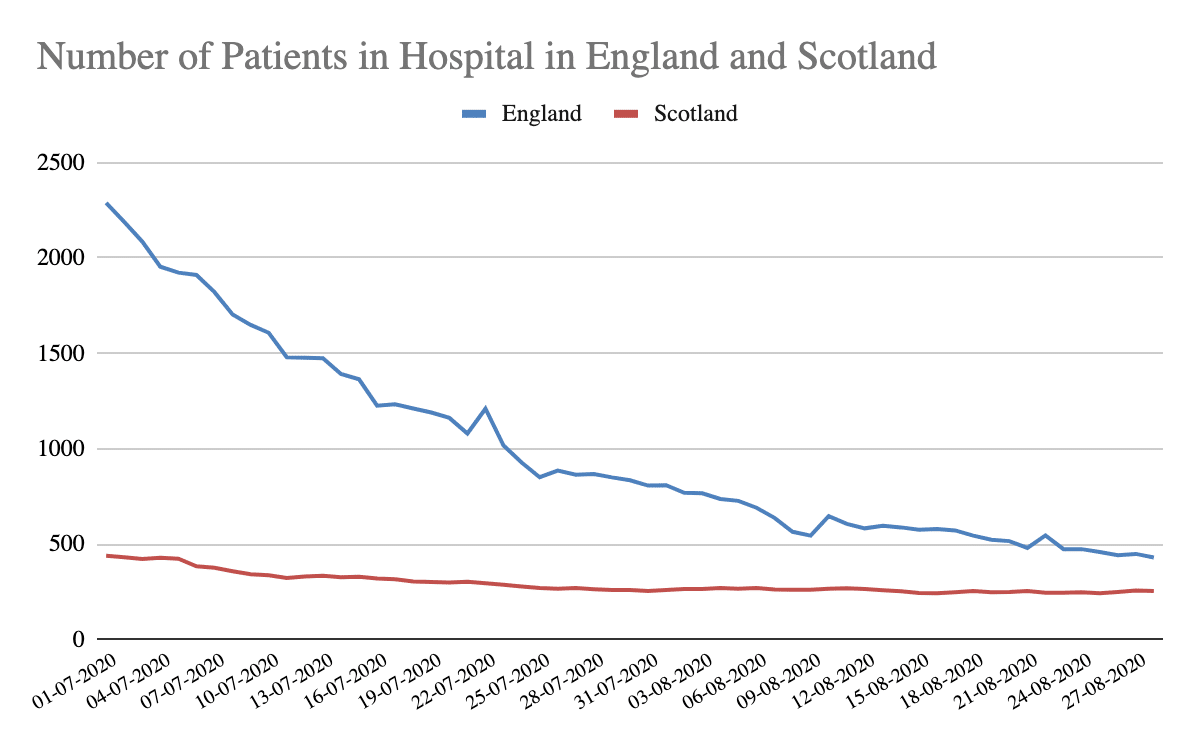Is Scotland overcounting the number of patients in hospital beds?
September 2, 2020
Carl Heneghan, Daniel Howdon, Jason Oke
Daily the UK Government website updates the COVID data. In the healthcare section, the daily count of confirmed COVID-19 patients in hospital at midnight the preceding night is reported.
In England, 430 patients were in hospital on the 28th of August. This is significantly down (by 81%) from the 2,289 reported on the 1st of July.
The number in Scotland has not dropped by a similar amount. There were 439 patients in a hospital bed on the 1st of July, which is down to 255 patients on the 28th of August (a reduction of 42%).

The difference between countries is much starker when you analyse the number of patients in beds per population given England’s population is about ten times greater than Scotlands (55.98M versus 5.45M).
In England 7.7 per million of the population are occupying a hospital bed. However, in Scotland 46.8 per million are in a hospital bed with Covid – a rate that is nearly six times higher.

According to Scottish government’s Coronavirus (COVID-19) definitions, the number of patients in hospital with suspected COVID-19 “may include people who are in hospital for other reasons but have previously tested positive for COVID-19.” While a count of new admissions to hospital only includes those who “tested positive for COVID-19 in the 14 days prior to admission to hospital, on the day of their admission, or during their stay in hospital”, no equivalent cutoff appears to be made for this count of individuals currently in hospital.
The impact of this appears to be potentially substantial: total numbers of individuals in hospital in Scotland rose by 15 from 255 to 270 between the 31st July and 4th August, a time period that saw a total of only 4 new admissions as defined by testing positive at or after admission or within the 14 days prior to hospitalisation.
This is similar to the problem with the PHE issue with deaths in England, which meant previously that everyone who has ever had COVID at any time must die with COVID too. The reason for the disparity in the Scottish data is not clear.
The problem matches the pattern of poor quality data whereby COVID analyses have overestimated the true extent of the problems. It is, therefore, essential that we have data that we can trust, data that is verifiable and reported in the same way across the devolved nations to permit comparisons.
Daniel Howdon is a Researcher, Health Economics, LIHS UCU Department Representative, Academic Unit of Health Economics, University of Leeds. Bio here
Carl Heneghan is Professor of Evidence-Based Medicine, Director of the Centre for Evidence-Based Medicine and Director of Studies for the Evidence-Based Health Care Programme. (Full bio and disclosure statement here)
Jason Oke is a Senior Statistician at the Nuffield Department of Primary Care Health Sciences and Module Coordinator for Statistical Computing with R and Stata (EBHC Med Stats), and Introduction to Statistics for Health Care Research (EBHC), as part of the Evidence-Based Health Care Programme.
Disclaimer: the article has not been peer-reviewed; it should not replace individual clinical judgement, and the sources cited should be checked. The views expressed in this commentary represent the views of the authors and not necessarily those of the host institution, the NHS, the NIHR, or the Department of Health and Social Care. The views are not a substitute for professional medical advice.

